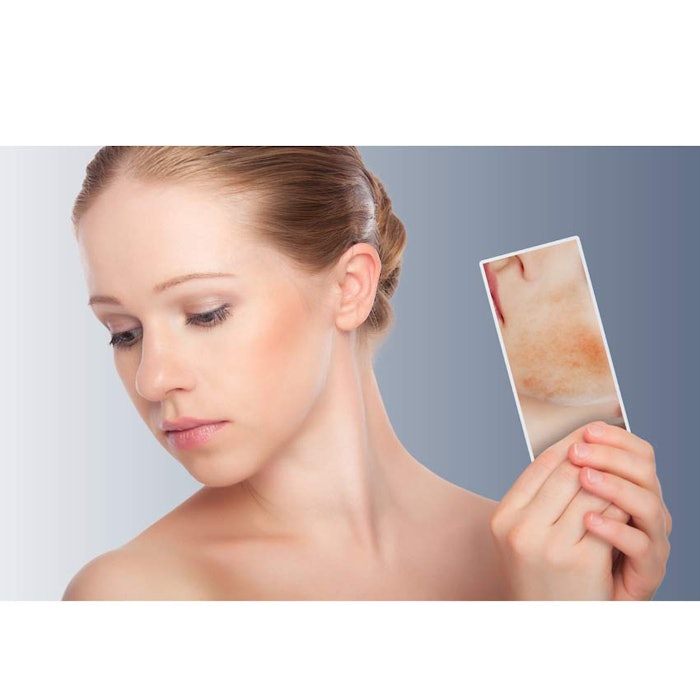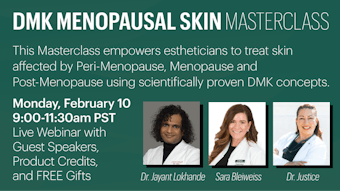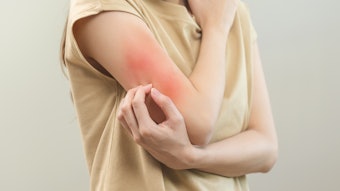
Here's a question for Rosacea Awareness Month this April: Could a widespread facial skin disorder be a signal for other possible health problems? Well, according to new studies there are potential associations between rosacea and increased risks of cardiovascular disease, gastrointestinal disease, certain types of cancer and many other systemic illnesses.
The National Rosacea Society (NRS) has designated April as Rosacea Awareness Month to alert the public to the early warning signs of this chronic facial disorder now estimated to affect more than 16 million Americans. Rosacea typically first strikes anytime after age 30, and may initially resemble a simple sunburn or an inexplicable blush. Without treatment, bumps and pimples often develop, growing more extensive over time, and burning, itching and stinging are common. In severe cases, especially in men, the nose may become enlarged from the development of excess tissue.
“Recently there have been a growing number of reports associating rosacea with a variety of potentially serious diseases,” said Richard Odom, M.D., professor of dermatology at the University of California-San Francisco. “Although it’s important to note that causal relationships between rosacea and these other diseases have not been demonstrated, this provides further reason for people who suspect they may have rosacea to seek diagnosis and appropriate treatment.”
Rosacea Study Reveals Hypertension and More
In a recently published analysis of more than 33,000 patients with rosacea in Taiwan, researchers found rosacea patients had a 41 percent greater risk of high cholesterol (dyslipidemia), a 35 percent higher risk of coronary artery disease and a 17 percent greater risk of high blood pressure (hypertension) than people without rosacea.1 In the “Nurses Health Study II” – an ongoing biennial questionnaire on the medical history of 116,000 nurses since 1989 – the more than 6,000 women diagnosed with rosacea were 1.59 times more likely to have thyroid cancer and 1.5 times more likely to have basal cell carcinoma, a form of skin cancer, than those without rosacea.2
Rosacea Study Examines Diabetes, Hormone Imbalance
A recent clinical study of 130 individuals with rosacea at Johns Hopkins University also found a significant association between rosacea and allergies, respiratory diseases, gastroesophageal reflux disease (GERD), diabetes, urogenital diseases and female hormone imbalance.3 Other recent studies have found increased risks of inflammatory bowel disease and glioma, a form of brain cancer, in people with rosacea.4,5
“As with any research, the associations found in these early studies may possibly be influenced by various confounding factors that will be clarified over time as scientific investigation continues,” said Odom. “Nonetheless, until the significance of these relationships is definitively determined and understood, it is reasonable for people who suspect they may have rosacea to seek appropriate medical evaluation of their skin and, if appropriate, their general health as well.”
Rosacea's Impact Goes Beyond the Surface
According to NRS surveys, most rosacea patients have felt the negative emotional and social effects of their condition regardless of severity. In a survey of 1,675 rosacea patients, 90 percent said the disorder's effect on their personal appearance had lowered their self-esteem and self-confidence, and 88 percent said they had suffered embarrassment. They also reported a wide range of negative feelings, including frustration, cited by 76 percent; anxiety and hopelessness, each noted by 54 percent; depression, 43 percent; anger, 34 percent; and isolation, 32 percent. Fifty-two percent of the respondents said they had avoided face-to-face contact because of the disorder. Among those with severe symptoms, 51 percent said they had even missed work because of their condition.
However, this skin disorder is not stopping these show stoppers, who all have suffered from rosacea at some point:
- Comedian W.C. Fields
- President Bill Clinton
- Princess Diana of Wales
- Singer Sam Smith
- Model Dita Von Teese
- Comedian Amy Schumer
How You Can Comfort Clients
Other than letting your clients know that they aren't alone, check for the warning signs of rosacea and urge them to see a dermatologist for diagnosis and treatment. Here are the warning signs:
- Redness on the cheeks, nose, chin or forehead
- Small visible blood vessels on the face
- Bumps or pimples on the face and watery or irritated eyes
Comprehensive information and materials on rosacea are available on the NRS website at rosacea.org. The NRS encourages those interested in spreading awareness during the month of April to visit the official Rosacea Awareness Month landing page at rosacea.org/ram and follow the online conversation using the hashtag #RosaceaAwareness.
References
1. Hua T-C, Chung P-I, Chen Y-J, et al. Cardiovascular comorbidities in patients with rosacea: a nationwide case-control study from Taiwan. J Am Acad Dermatol 2015;73:249-254.
2. Li W-Q, Zhang M, Danby FW, Han J, Qureshi AA. Personal history of rosacea and risk of incident cancer among women in the US. Br J Cancer 2015;113:520-523.
3. Rainer BM, Fischer AH, Luz Felipe da Silva DL, Kang S, Chien AL. Rosacea is associated with chronic systemic diseases in a skin severity dependent manner: results of a case-control study. J Am Acad Dermatol 2015;73:604-608.
4. Spoendlin J, Karatas G, Furlano RI, Jick SS, Meier CR. Rosacea in patients with ulcerative colitis and Crohn’s disease: a population-based case-control study. Inflamm Bowel Dis 2015 Dec 29. [Epub ahead of print]
5. Egeberg A, Hansen PR, Gislason GH, Thyssen JP. Association of rosacea with risk for glioma in a Danish nationwide cohort study. JAMA Dermatol 2016 Jan 27. Doi:10.1001/jamadermatol.2015.5549. [Epub ahead of print]










